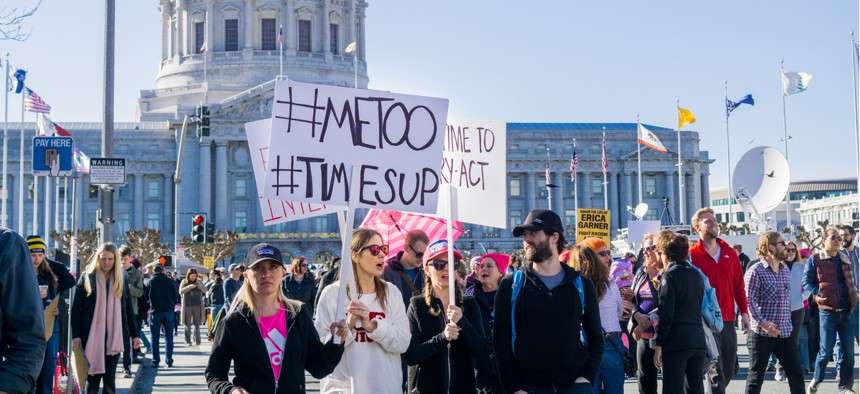
Protestors rally at a march in San Francisco in 2018. Sundry Photography / Shutterstock.com
Women Take a Hit For Reporting Sexual Harassment, But #MeToo May Be Changing That
By chance, a sociologist started an experiment the day sexual harassment allegations against Harvey Weinstein became public. As the #MeToo movement gained steam, people's responses changed.
An unprecedented number of women have come forward to share stories of workplace sexual harassment since the #MeToo movement gained momentum in late 2017.
Yet their allegations are not always well received. Questions like “What took her so long?” and “Why didn’t she report it when it happened?” have become a refrain. They imply that women who initially chose not to report sexual harassment handled it incorrectly - even incompetently.
But my research shows that woman have rational reasons for staying quiet because reporting sexual harassment can come with career risks. An experiment I ran five times in the early months of the #MeToo movement, though, suggest that things may be changing for the better.
Self-reporting stymies promotion
In a national survey experiment, I asked Americans to read the fictitious employee file of a woman named Sarah, described as a satisfactory employee who was enthusiastic about her work. Everyone read the same information about her work performance.
However, study participants saw different information about mistreatment Sarah had experienced. In one condition, Sarah reported to HR that a coworker had repeatedly made sexual comments about her body; in a second condition, she reported that a coworker had repeatedly shouted and sworn at her. In a third condition, no harassment was reported. Then I asked participants to rate how likely they would be to promote Sarah.
Each group of participants should have been equally likely to promote Sarah in every case. After all, everyone in the study had identical information about her performance, the most relevant information for making decisions about advancement.
But that’s not what happened. Participants were just as likely to promote Sarah when she reported the nonsexual harassment as when there was no harassment at all. But they were reluctant to promote her when she reported sexual harassment.
Simply by following the rules – using her company’s designated procedure to report the sexual harassment – Sarah’s career advancement was jeopardized.
This finding suggests that women who hesitate to report sexual harassment are acting not incompetently, but perceptively and rationally.
Not reporting to avoid stigma
Indeed, research shows that women sometimes choose not to report or even label unwanted sexual interactions as sexual harassment in part to avoid the perceived stigma of being a target of sexual harassment.
If reporting sexual harassment comes at the cost of future advancement, choosing not to do so becomes strategic.
Why, though, would people hesitate to promote a woman who reported sexual harassment? Cultural stereotypes about the kind of women who are thought to report sexual harassment help to explain.
A woman who reports sexual harassment is often viewed as conniving, deceitful or overly sensitive. People wonder whether she fabricated the account to sabotage a coworker or was overreacting to a friendly remark.
Consider the example of Anita Hill. When she testified in 1991 that Supreme Court nominee Clarence Thomas had harassed her, Hill was labeled “a little bit nutty and a little bit slutty.”
Indeed, I found part of the reason that participants were less willing to promote Sarah when she had reported sexual harassment was because they saw her as lower in characteristics like warmth and social skills.
A clear implication of this study is that it does not make sense to doubt or denigrate people who choose not to report sexual harassment.
In fact, there is no surefire response available to targets of sexual harassment that will improve the situation; while strategies like reporting, direct confrontation or avoiding the harasser are sometimes effective, they sometimes only make things worse.
So although reporting sexual harassment might help, it may simultaneously jeopardize one’s career advancement. Caught in this catch-22, there is no one right way for a victim to respond to sexual harassment.
What can be done to make reporting sexual harassment less risky? There are two ways forward.
First, bystanders who observe sexual harassment may be able to help. When study participants read a file in which a coworker, acting as a bystander, reported that Sarah had been sexually harassed, Sarah’s promotion chances were not damaged. Stepping in to report sexual harassment on someone else’s behalf, with their consent, may therefore help defray the costs to the victim of reporting it.
Yet this solution doesn’t change the unfair reality that women are penalized for speaking out against sexual harassment. To address this requires cultural change.
Can #MeToo reduce the penalty?
My research suggests that the United States may be in the midst of such a shift. I first ran the experiment in early October of 2017, only weeks before the #MeToo hashtag began trending. As women spoke out about their experiences of sexual harassment en masse, I reran the experiment.
As the #MeToo movement unfolded, bias against the woman who reported sexual harassment faded. Indeed, by early 2018, participants were just as likely to promote Sarah when she reported sexual harassment as any other case.
This trend should be interpreted cautiously – a year has passed since I fielded the study, and people who speak out against sexual violence continue to be questioned and maligned. There is no guarantee that people who report sexual harassment will now be treated fairly, so it is still reasonable to worry that reporting it may harm one’s career.
Yet at the very least, these changes suggest that cultural views about women who report sexual harassment are malleable. By illuminating how widespread and pervasive sexual harassment remains in the U.S., those who spoke out about their own harassment may have shifted how Americans view others following in their footsteps.
![]()
![]()
This post originally appeared at The Conversation. Follow @ConversationUS on Twitter.






